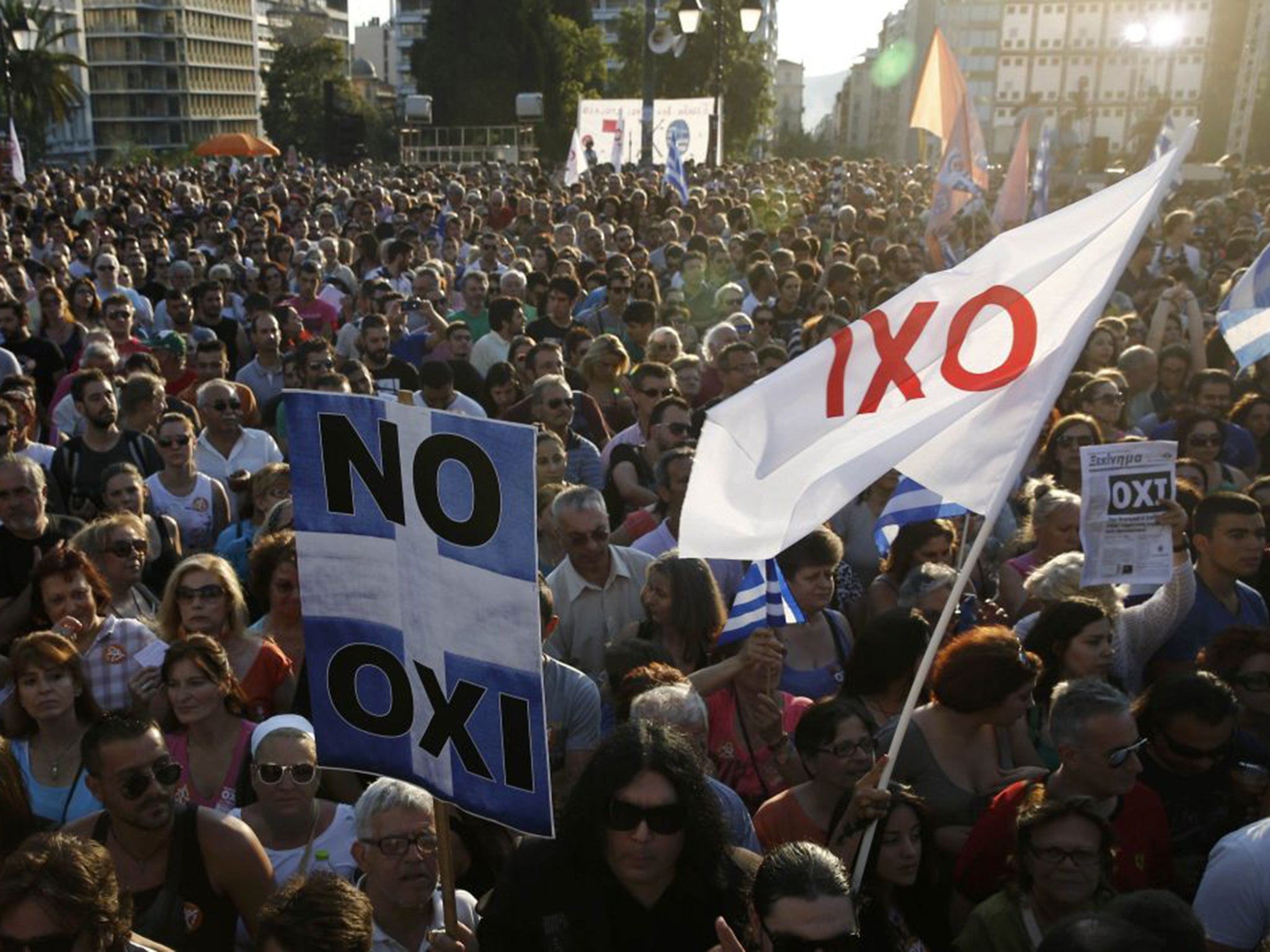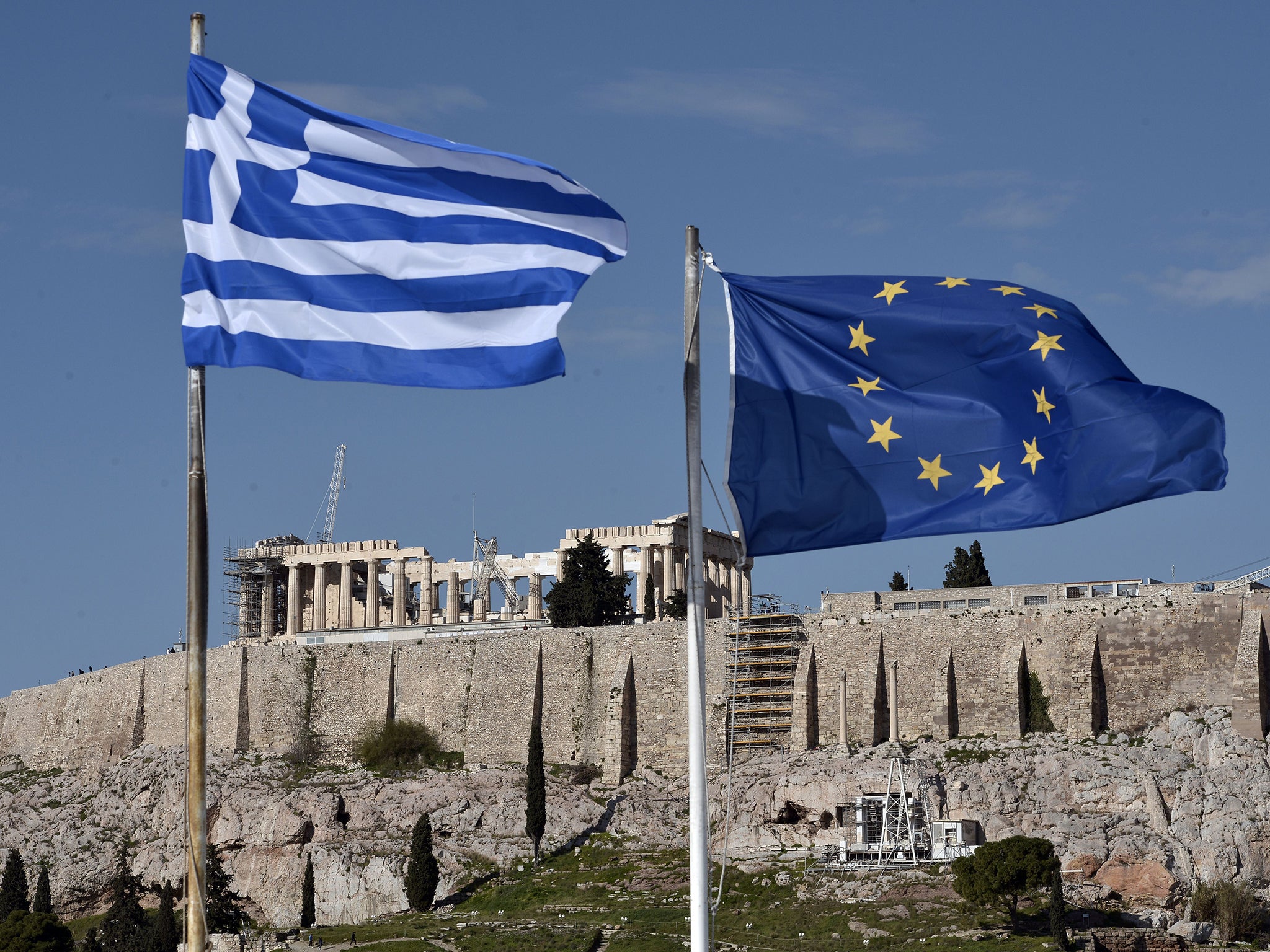Greece crisis: Referendum exposes a gaping hole at the heart of the European Union – its lack of genuine legitimacy
Thankfully, there’s nothing meek about the Greeks


Your support helps us to tell the story
From reproductive rights to climate change to Big Tech, The Independent is on the ground when the story is developing. Whether it's investigating the financials of Elon Musk's pro-Trump PAC or producing our latest documentary, 'The A Word', which shines a light on the American women fighting for reproductive rights, we know how important it is to parse out the facts from the messaging.
At such a critical moment in US history, we need reporters on the ground. Your donation allows us to keep sending journalists to speak to both sides of the story.
The Independent is trusted by Americans across the entire political spectrum. And unlike many other quality news outlets, we choose not to lock Americans out of our reporting and analysis with paywalls. We believe quality journalism should be available to everyone, paid for by those who can afford it.
Your support makes all the difference.And now for Greece’s moment of truth. Or not, as the case may be. The effectively bankrupt country, its economy paralysed and its banks set to run out of cash on Monday, goes to the vote in a referendum that may determine its continuing membership of the euro, as well as the fate of Prime Minister Alexis Tsipras and his Syriza government. But no one knows what will happen. Only one thing is sure. More hardship beckons.
A Yes vote (to a bailout package that, incidentally, is no longer officially on the table) spells further austerity. A No vote could well bring a return to the former currency, the drachma, and generalised national impoverishment. Or, just conceivably, if the EU blinks in fear of a disintegration of the euro – even of the entire European project – a No majority might just be the key that unlocks the door to a deal.

I live in the US at a safe, but also illuminating, distance from the crisis. Here, the prevailing view is sheer disbelief that things have come to this pass. How can the European Commission, the IMF and the European Central Bank, the “Troika” with whom Greece is negotiating, still hew to German-prescribed austerity, seeking to pile more misery upon misery, cutbacks upon cutbacks, when five years of such medicine has produced almost endless recession and 25 per cent unemployment? Why revisit the policy idiocies that produced the Great Depression, liberal US economists argue: will they never learn?
There is amazement too that if there is to be more austerity, the prospect is not sweetened by rescheduling or writing off a good portion of Greece’s debt of €250bn or more, which everyone knows can never be repaid. That at least might have given Greeks hope that there was light at the end of austerity’s tunnel. And whatever happened to the notions of solidarity and mutual support envisaged by the EU’s founding fathers?
Instead, Athens must play by the rules, it is told by official Europe, that conveniently forgets how both France and Germany earlier went unpunished for violations of the EU’s budget deficit regulations. Plainly, one set of rules applies to the powerful and another for the weak.
And there’s another, more personal reason, for my sympathy towards Greece. More decades ago than I care to remember, I studied its modern language and its wonderful modern literature, and travelled there constantly. The experience left me with a deep affection for a maddening, ferociously proud and hugely generous people. The place could drive you crazy, but I loved it.
None of this blinds me to the facts. Yes, Greece has been a leading member of the EU’s awkward squad ever since it joined in 1981. Its acceptance as the 10th member of the European Community (as it was then called) owed more to the heart than the head. Membership, just six years after the Colonels were forced from power, would guarantee Greek democracy – and how could Europe deny entry to the land of Aeschylus and Plato, the very cradle of the Western world?
In fact, today’s Greece is a descendant more of Byzantium than of classical Athens. And back in the mid-1970s, Europe’s bureaucrats warned that this relatively poor country, with a fairly primitive economy, on the Continent’s farther fringes, was simply not ready to join. But the European Commission was overruled by the politicians. The same, basically, went for Greece’s adoption of the euro a quarter of a century later (an error admittedly facilitated by the then Athens government’s cooking of the books to qualify). But had heads ruled hearts in 2001, the biggest crisis to hit the EU in its history would never have happened.

And yes, successive Greek governments were profligate borrowers and spenders, building a bloated welfare state paid for with other people’s money while doing nothing to force through needed reforms. And yes, Tsipras has played his hand lousily.
When his Syriza party was elected in January on an anti-austerity platform, there was much sympathy for its demands. Instead, his in-your-face style and erratic, ever-shifting demands have alienated likely sympathisers. A skilful politician might have built a broad European front against the austerity preachers in the Brussels bureaucracy and the organ grinders in Berlin. But he blew it. These days, everyone is simply fed up with Greece.
And now the referendum. When Tsipras announced it eight days ago, urging his countrymen to vote No, it briefly seemed like a potential masterstroke – what’s called here a “Hail Mary” pass, a last-ditch gamble by an American football quarterback to claim victory from seemingly inevitable defeat. Alas, the move now looks more like a dreadful miscalculation that makes a deal more unlikely, and that could force Prime Minister Tsipras to resign.
But by calling the vote, he has also rendered a massive service, reminding everyone of the gaping hole at the heart of the EU: its lack of genuine popular legitimacy. Syriza, which had made no secret of its goals, was democratically elected. Now, when the success or failure in attaining those goals may determine Greece’s future in the 21st century, he is again asking the people to decide.

And the response from the Euro establishment? An outraged “How dare he” – that this young and tireless left-wing upstart might seek actually to bring the people into the decision-making process, instead of meekly bowing to what the great and the good in Brussels and Berlin had already decided.
Beyond doubt, some of these latter want nothing more than Greece out of the euro and Tsipras out of the prime minister’s office. But a clear majority of Greeks want to keep the euro, and my own guess is the Yes vote will narrowly prevail. But don’t bank on it. Greeks have a sense of honour, and a hatred of humiliation to match.
“No” is a noble and resounding word in Greek history, dating back to October 1940 when the Greek leader Ioannis Metaxas rebuffed Mussolini’s demand for occupation rights on Greek territory. There followed the triumph in the Greco-Italian war that Greeks celebrate to this day. Could history be about to repeat itself?
Join our commenting forum
Join thought-provoking conversations, follow other Independent readers and see their replies
Comments